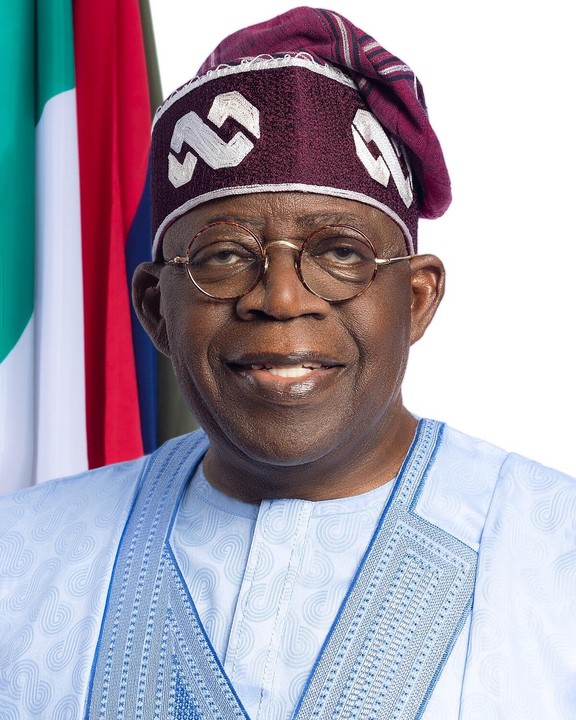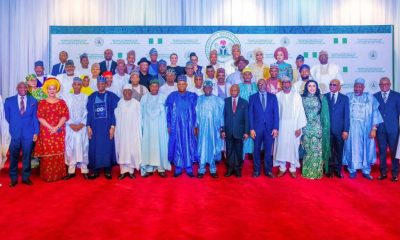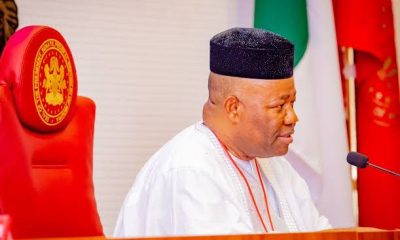Headline
Ministerial list: IPAC calls for inclusion of opposition party members to stabilize the polity

The Inter Party Advisory Council (IPAC), has commended President Bola Tinubu for the release of the ministerial list, but called for the inclusion of members of opposition parties for stability in the polity.
The National Chairman of IPAC, Mr Yabaji Sani, made the call in a statement signed on Friday in Abuja by Mrs Chinyere Kalu, the IPAC National Publicity Secretary.
Sani said it was pertinent for the president to bring on board more opposition party members, which would be in tandem with his campaign promises to all Nigerians.
“Following the release of the much-awaited ministerial list of nominees to the Senate on Thursday, July 27, by President Bola Ahmed Tinubu, IPAC has called for the need for more inclusivity for stability in the body polity.
“The list which was delivered by the Chief of Staff, Mr. Femi Gbajabiamila, contains 28 names with four former governors, seven women and 16 other notable Nigerians from all walks of life.
“IPAC commends Mr President for complying with the stipulated constitutional time frame of 60 days after swearing in, in submitting the ministerial nominees to the Senate for screening and confirmation.
“Noteworthy is that the President brought on board people with good professional track records, thereby fulfilling his promise of uniting Nigerians on the mantra of ‘Renewed Hope,” he said.
He, however, added that “while acknowledging and appreciating the way he has run the affairs of the State so far, IPAC suggests that Mr President should do away with the winner takes all syndrome, and chart a way forward for the nation.
“Mr President should be more magnanimous by bringing on board more opposition party members, which will be in tandem with his campaign promises to all Nigerians and even after the elections, where he pledged to run an all inclusive government,” he said.
Headline
Fagbemi warns against obstructing EFCC from performing its lawful duty

The Minister of Justice, Lateef Fagbemi, SAN has warned against obstructing the Economic and Financial Crimes Commission (EFCC) from carrying out its lawful duty .
Fagbemi’s warning is contained in a statement in Abuja.
“This is a matter of very grave concern, it is now beyond doubt that the EFCC is given power by the law to invite any person of interest to interact with them in the course of their investigations into any matter, regardless of status.
“Therefore, the least that we can all do when invited, is not to put any obstruction in the way of EFCC, but to honourably answer their invitation.
“A situation where public officials who are themselves subject of protection by law enforcement agents will set up a stratagem of obstruction to the civil and commendable efforts of the EFCC to perform its duty is to say the least, insufferably disquieting’’.
He added that running away from the law will not resolve issues at stake but only exacerbate them.
“Nigeria has a vibrant judicial system that is capable of protecting everyone who follows the rule of law in seeking protection.
“I therefore encourage anyone who has been invited by the EFCC or any other agency to immediately toe the path of decency and civility by honouring such invitation instead of embarking on a temporising self-help and escapism.
“This can only put our country in bad light before the rest of the world’’.
He said institutions of state should be allowed to function effectively and efficiently.
“I stand for the rule of law and will promptly call EFCC, and indeed any other agency to order when there is an indication of any transgressions of the fundamental rights of any Nigerian by any of the agencies’’.
NAN reports that the EFCC had on Wednesday warned members of the public that it was a criminal offence to obstruct officers of the Commission from carrying out their lawful duties.
Section 38(2)(a(b) of the EFCC Establishment Act makes it an offence to prevent officers of the Commission from carrying out their lawful duties. Culprits risk a jail term of not less than five years.
The warning , the EFCC said, became necessary against the background of the increasing tendency by persons and groups under investigation by the Commission to take the laws into their hands by recruiting thugs to obstruct lawful operations of the EFCC.
On several occasions, the anti graft agency said, operatives of the Commission have had to exercise utmost restraint in the face of such provocation to avoid a breakdown of law and order.
Headline
Unknown Gunmen Abduct Channelstv Reporter In Port-harcourt

Some unknown gunmen have kidnapped Joshua Rogers, the ChannelsTV reporter in Port-Harcourt, the Rivers State capital.
Politics Nigeria learnt that Rogers was picked up close to his residence at Rumuosi in Port Harcourt and to an unknown destination by the gunmen around 9pm on Thursday, April 11.
The reporter was driving his official ChannelsTV branded car when the hoodlums accosted, pointed a gun at him and took him away in the same vehicle.
Rogers was said to be returning from his official assignment in Government House after a trip to Andoni for a government event when the incident happened.
Already, the gunmen were said to have contacted his wife and demanded a N30million ransom for bis release.
His cameraman confirmed the incident and appealed to his abductors to set him free unconditionally.






















